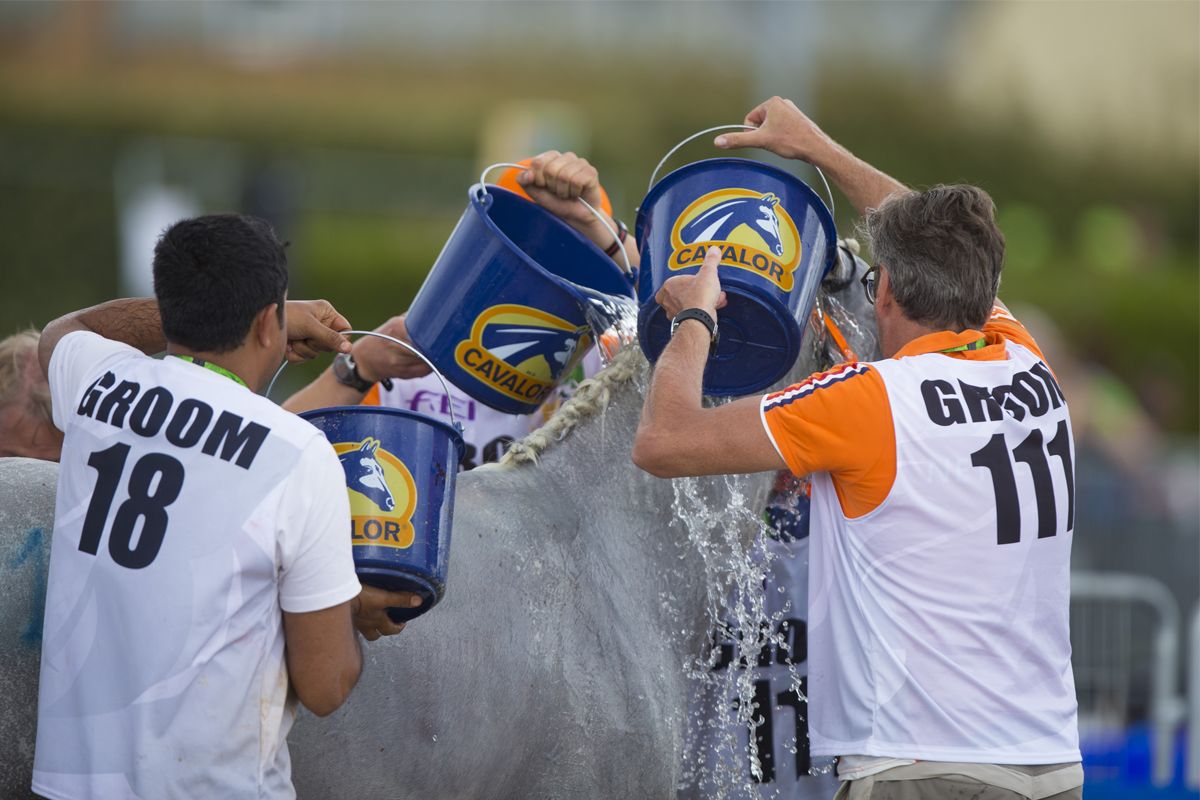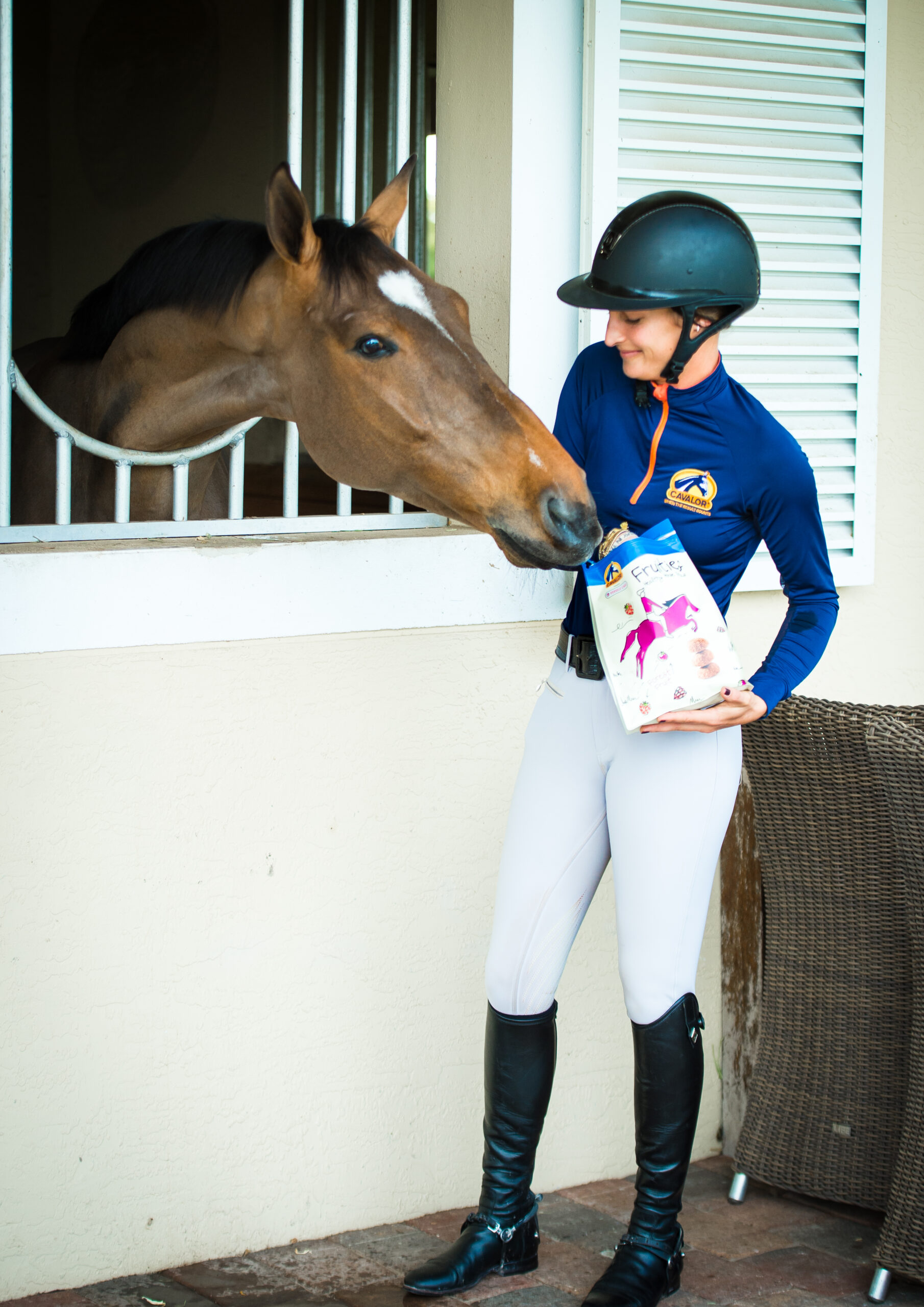With summer in town it is the perfect time to stress the importance of electrolytes. Some equestrians feed them to their horses daily, while others only feed them in extreme heat or during a strenuous competition. But when do horses need those extra electrolytes, and why?
Just like humans, horses sweat to control their body temperature. The equine body thermo regulates by giving off heat through sweat, however this process also has its disadvantages. In addition to a serious amount of fluids, the body also loses a large quantity of electrolytes. These fluids and electrolytes must be replenished after sweating to avoid dehydration and to ensure all biochemical processes in the equine body continue to function properly.
The driving force behind fluid transport
Electrolytes are minerals that pass electrical impulses through the body. They have the ability to bind with other ions to form salt crystals. Electrolytes are especially important for fluid regulation, maintaining the pH balance in the body, and can be regarded as the driving force behind water transportation through the entire body. In addition, they have a big influence on muscle and nerve functions. The most important electrolytes are Sodium, Potassium and Chloride.
Electrolytes are especially important for fluid regulation
The importance of water
Electrolytes play an important role in fluid regulation in the horse. They help to prevent dehydration, but of course water is also crucial in this process. When we administer electrolytes, it is important that the horse has plenty of fresh drinking water available. A 500kg horse drinks around 25-30 litres of water a day. In high temperatures, under strenuous labour or in lactating mares, the need is significantly higher. When the horse is on unfamiliar grounds, such as at a competition, they can sometimes refuse to drink. To prevent the horse from not drinking enough during transport or competition, it can help to add a palatable flavour to the water a few days in advance. This helps the horse drink better when you add the same flavouring away from home. In an effort to regulate the amount of fluids your horse is getting, it is recommended to offer water in buckets only. In this way, you can easily measure how much it has been effectively drinking in one day. When horses lose a lot of fluids and electrolytes, the drinking response may become disrupted and the horse might refuse to drink. A little salt on the horse’s tongue may prompt it to start drinking. Not only is the amount of water the horse drinks in a day of great importance, but the quality of the drinking water as well. If water from a well is used, it may be advisable to have the water analysed to ensure it meets the quality standards for drinking water.
The body’s own system
Electrolytes leave the body in various ways: not only through sweat, but also urine and faeces. At rest, the amount of electrolytes a horse absorbs is closely related to the amount of electrolytes that leave the body through the urine. The more electrolytes that are absorbed through hay, feed or supplements, results in more electrolytes that will pass via the urine. When the horse starts sweating, however, more electrolytes will leave the body through sweat and the electrolyte count of the urine will decrease. In this way, the horse can maintain its electrolyte balance. The graph shows how the secretion of Chloride in the urine drops and the Chloride secretion in the sweat increases. To maintain the electrolyte balance, it is important to ensure the amount of electrolytes that is absorbed in the body is proportional to the amount of electrolytes that leave the body through sweat and urine. If the amount of electrolytes that is absorbed is lower than the amount that is secreted through sweat and urine, the kidneys will compensate for this deficiency thanks to an electrolyte saving mechanism. In this case, it will take two to three days for the electrolyte pool to fully recover. For sport horses which frequently sweat a lot, this bodily system is therefore not always efficient enough.
Administering electrolytes after sweating
The mechanism mentioned above does not only explain why horses that sweat frequently should be given additional electrolytes; it also clarifies why the timing of electrolyte administration is so important. If we administer electrolytes with the feed in the morning, without the horse working immediately after, the absorption of electrolytes and the secretion of electrolytes in the urine will increase. The reason for this is that the horse cannot store electrolytes. The equine body is made of billions of cells: the electrolytes exist in the fluids surrounding these cells, the fluids within these cells and in the blood. There are no tissues or organs in the equine body that can store large amounts of electrolytes. Electrolytes that are not used up immediately, will be secreted. That is why it is so important to give the electrolytes right before sweating, and especially right after sweating. This way, the absorbed electrolytes can compensate for the losses through the sweat immediately.
White or foaming sweat
It is often thought that the colour of the sweat indicates how much electrolytes are lost through the sweat, but this is not completely true. The colour of the sweat is influenced partially by the presence of a particular protein, namely latherin. Latherin is responsible for decreasing the surface tension of the sweat, enabling it to pass through the horse’s coat more easily. This is a big advantage, given the fact that the horse’s coat is not easily permeable. With the help of latherin, the sweat is able to pass more easily and the process of thermo regulation becomes more efficient. Therefore, there is no reason to panic when a horse’s sweat turns white and foamy as this is simply a way of passing the heat created in the body more efficiently.
Transport
In addition to training, horses can lose a significant amount of electrolytes during transport. On a 24-hour journey, a horse can lose approximately 5% of its body weight in fluids. Therefore, it is extremely important horses receive plenty of fluids and electrolytes before, during and after transport. Before the journey, be sure to provide plenty of hay and easily digestible feed such as mash, combined with electrolytes. During and after the journey, it is also advisable to provide plenty of roughage and easily digestible meals, in combination with electrolytes and abundant fresh drinking water.
Salt alone is not enough
If we want to replenish all the electrolytes lost in the sweat in order to speed up recovery, it is advisable to provide a complete electrolyte mix. Regular salt only contains Sodium and Chloride, and cannot replace the lost Potassium. All electrolytes influence each other; and therefore the administration of a particular electrolyte also affects absorption of the other electrolytes. Therefore the electrolytes should be administered to the horse in the proper balance. Besides this, the addition of Fructose to certain electrolyte mixes will aid in the transport of the electrolytes through various membranes. These electrolyte mixes also contain additional base substances that support the recuperation process. When choosing an electrolyte mixture, be sure to keep in mind which carrier is used and consider whether this carrier is functional in the supplement. Fructose, for example, is a functional carrier while wheat semolina or alfalfa have no nutritional function when it comes to electrolytes. Information on carriers can usually be found on the label.
All electrolytes influence each other
Electrolytes throughout the year
While electrolytes are mostly given in summer, there is no value in adding them to the daily ration. Adding electrolytes is only beneficial during transport, exercise, competitions or other situations where the horse excessively sweats. Providing electrolytes at those times is advisable regardless of the outside temperature or season. Of course horses sweat more in summer, but keep those winter trainings in the indoor in mind!
Cavalor products
Cavalor Mash & Mix is a well-earned reward after heavy exertion. It replenishes lost minerals after heavy exertion.
Cavalor Electroliq/Electrolyte Balance provides the necessary electrolytes for optimal recovery after heavy sweating. During stress, intensive exercise, hot summer days or travel, horses lose water and important minerals. Since they cannot build up reserves for this, it is important to replenish lost electrolytes right before or immediately after sweating. Cavalor electrolytes prevent dehydration and help keep horses fresher, capable of faster recovery and able to handle longer periods of intensive training, competition and travel. Cavalor Electrolyte Balance and Cavalor Electroliq Balance are formulated in such a way that the minerals are easily absorbed in the correct proportions.
Cavalor An Energy Boost contains key nutrients for your horse and an extra boost of energy for before and during intense work and speedy recovery afterwards. Cavalor An Energy Boost also contains electrolytes to help with speedier recovery after competition or periods of intense work. Electrolytes are lost during perspiration and must be quickly replenished to prevent stiff muscles, support the recovery phase, and keep the horse in good shape.
Of course, we also have care products for cooling your horse, you can find them here.


